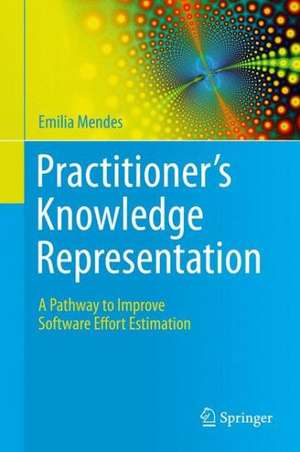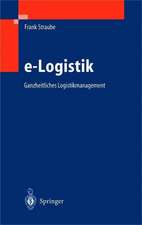Practitioner's Knowledge Representation: A Pathway to Improve Software Effort Estimation
Autor Emilia Mendesen Limba Engleză Hardback – 12 mai 2014
Emilia Mendes presents the Expert-Based Knowledge Engineering of Bayesian Networks (EKEBNs) methodology, which she has used and adapted during the course of several industry collaborations with different companies world-wide over more than 6 years. The book itself consists of two major parts: first, the methodology’s foundations in knowledge management, effort estimation (with special emphasis on the intricacies of software and Web development) and Bayesian networks are detailed; then six industry case studies are presented which illustrate the practical use of EKEBNs. Domain experts from each company participated in the elicitation of the bespoke models for effort estimation and all models were built employing the widely-used Netica ™ tool. This part is rounded off with a chapter summarizing the experiences with the methodology and the derived models.
Practitioners working on software project management, software process quality or effort estimation and risk analysis in general will find a thorough introduction into an industry-proven methodology as well as numerous experiences, tips and possible pitfalls invaluable for their daily work.
| Toate formatele și edițiile | Preț | Express |
|---|---|---|
| Paperback (1) | 328.79 lei 6-8 săpt. | |
| Springer Berlin, Heidelberg – 23 aug 2016 | 328.79 lei 6-8 săpt. | |
| Hardback (1) | 335.03 lei 6-8 săpt. | |
| Springer Berlin, Heidelberg – 12 mai 2014 | 335.03 lei 6-8 săpt. |
Preț: 335.03 lei
Preț vechi: 418.79 lei
-20% Nou
Puncte Express: 503
Preț estimativ în valută:
64.11€ • 68.55$ • 53.45£
64.11€ • 68.55$ • 53.45£
Carte tipărită la comandă
Livrare economică 18 aprilie-02 mai
Preluare comenzi: 021 569.72.76
Specificații
ISBN-13: 9783642541568
ISBN-10: 3642541569
Pagini: 224
Ilustrații: XI, 211 p. 84 illus.
Dimensiuni: 155 x 235 x 18 mm
Greutate: 0.49 kg
Ediția:2014
Editura: Springer Berlin, Heidelberg
Colecția Springer
Locul publicării:Berlin, Heidelberg, Germany
ISBN-10: 3642541569
Pagini: 224
Ilustrații: XI, 211 p. 84 illus.
Dimensiuni: 155 x 235 x 18 mm
Greutate: 0.49 kg
Ediția:2014
Editura: Springer Berlin, Heidelberg
Colecția Springer
Locul publicării:Berlin, Heidelberg, Germany
Public țintă
Professional/practitionerCuprins
Chapter 1: Introduction to knowledge management.- Chapter 2: Web development vs. software development.- Chapter 3: Introduction to effort estimation.- Chapter 4: Literature review on Web effort estimation.- Chapter 5: Introduction to Bayesian network models.- Chapter 6: Expert-based knowledge engineering of Bayesian networks.- Chapter 7: First case study.- Chapter 8: Second case study.- Chapter 9: Third case study.- Chapter 10: Fourth case study.- Chapter 11: Fifth case study.- Chapter 12: Sixth case study.- Chapter 13: Ways in which to use Bayesian network models within a company.- Chapter 14: Conclusions.
Notă biografică
Emilia Mendes is a Professor of Software Engineering at the Blekinge Institute of Technology (Sweden) and has been a full-time academic for the past 14 years, making significant research and practical contributions to her fields of research - empirical Web/software engineering, measurement and metrics. Her findings provide solutions to industry, helping to improve development processes and products. Her Springer book on Web engineering in 2006 was the first to provide industry and academia with theory as well as case studies on numerous aspects related to Web development and measurement. Prior to her academic career, she worked in the ICT industry for ten years as a programmer, business analyst and project manager.
Textul de pe ultima copertă
The main goal of this book is to help organizations improve their effort estimates and effort estimation processes by providing a step-by-step methodology that takes them through the creation and validation of models that are based on their own knowledge and experience. Such models, once validated, can then be used to obtain predictions, carry out risk analyses, enhance their estimation processes for new projects, and generally advance them as learning organizations.
Emilia Mendes presents the Expert-Based Knowledge Engineering of Bayesian Networks (EKEBNs) methodology, which she has used and adapted during the course of several industry collaborations with different companies world-wide over more than 6 years. The book itself consists of two major parts: first, the methodology’s foundations in knowledge management, effort estimation (with special emphasis on the intricacies of software and Web development), and Bayesian networks are detailed; then six industry case studies are presented which illustrate the practical use of EKEBNs. Domain experts from each company participated in the elicitation of the bespoke models for effort estimation, and all models were built employing the widely-used Netica ™ tool. This part is rounded off with a chapter summarizing the experiences with the methodology and the derived models.
Practitioners working on software project management, software process quality, or effort estimation and risk analysis in general will find a thorough introduction into an industry-proven methodology as well as numerous experiences, tips and possible pitfalls invaluable for their daily work.
Emilia Mendes presents the Expert-Based Knowledge Engineering of Bayesian Networks (EKEBNs) methodology, which she has used and adapted during the course of several industry collaborations with different companies world-wide over more than 6 years. The book itself consists of two major parts: first, the methodology’s foundations in knowledge management, effort estimation (with special emphasis on the intricacies of software and Web development), and Bayesian networks are detailed; then six industry case studies are presented which illustrate the practical use of EKEBNs. Domain experts from each company participated in the elicitation of the bespoke models for effort estimation, and all models were built employing the widely-used Netica ™ tool. This part is rounded off with a chapter summarizing the experiences with the methodology and the derived models.
Practitioners working on software project management, software process quality, or effort estimation and risk analysis in general will find a thorough introduction into an industry-proven methodology as well as numerous experiences, tips and possible pitfalls invaluable for their daily work.
Caracteristici
Presents an industry-proven methodology for (software) effort estimation Illustrated by several case studies employing a widely-used tool Author with long-term experience in industry and academia Includes supplementary material: sn.pub/extras
















